Has Harvey Already Won?
The legal AI startup is reportedly raising new capital at a $5B Valuation. Should everyone else give up?
How can you not be impressed by Harvey?
Even if you were a Harvey-skeptic or even an outright Harvey-hater, admit it: you didn’t think they’d get this far this quick. So, are we ready to crown them?
Hey there, I’m Zach Abramowitz and I’m Legally Disrupted. Today, I’m finally ready to drop the sequel to my widely read post “So Much Hate For Harvey, and I Can’t Help But Love It.” Want to know why? Because Harvey means a lot of eyeballs and I’m nothing if not click-hungry. My posts about Harvey got roughly 2.5x the traffic of my next highest read post.
But, before I give you the Harvey hot take you’ve been so desperately craving, first let me tell you about an opportunity for you and to meet in person. If you don’t care and just want to get to the Harvey stuff scroll past next the picture.
I’m going to be speaking in San Francisco this Thursday, June the 12th at Legal Innovators California, brought to you Artificial Lawyer founder Richard Tromans and Cosmonauts CEO Timo Karkashev, the hardest working man in #legaltech. I’m going to be on stage recording two live podcasts: one with Gravity Stack’s Bryon Bratcher and the other on investing in legaltech with Chris Fisher from Myriad Ventures and Jonathan Levy from Y Combinator. I will also be judging the startup competition at the end of the Day with Eli Amsellem from Ridge Ventures who knows more about the legal AI startup ecosystem than just about anyone I’ve met, VC or otherwise (podcast with him dropped today). If you’re in San Francisco and like to attend the conference, you can register using this link.
Making the Case for Harvey
Ladies and gentlemen of the Legally Disrupted Jury, the case for Harvey is pretty simple: a pair of elite founders with unique experience have executed at an unprecedented speed and scale. They show no signs of slowing down and their lead is insurmountable.
Some important background — and pay close attention, because I’ll be circling back to many of these details. Harvey, originally named Counsel AI was founded by first year O’Melveny attorney Winston Weinberg and Gabriel Pereya, an AI researcher who worked had worked at Google Brain and Deep Mind. Harvey launched publicly two and half years ago in the wake of ChatGPT’s arrival, complete with a seed investment from OpenAI. Shortly after, Harvey launched its partnership with Allen & Overy in February of 2023, and at the time I said publicly that this was a big deal. (Check the comments on my X post, you’ll see that not everyone agreed)
A mere two years later, Harvey is in advanced talks to raise capital at a $5 billion valuation according to a report from Reuters. The company’s annualized revenue run rate hit $75 million in April, up from $50M earlier this year (50% growth in a matter of months).
So, I’ll repeat what I wrote two years ago when I analyzed the A&O announcement: this ain’t your grandpappy’s #legaltech. Here are just two examples:
It took eDiscovery leader Relativity a decade plus to reach a billion dollar valuation, it took NetDocuments over twenty years. Law firms are supposed to be hard to sell to, and legal departments don’t have big tech budgets. Harvey is closing deals with both.
VCs have mostly been burned by startups selling to legal, but that hasn’t prevented Harvey from raising capital from from Google Ventures, Kleiner Perkins, Sequoia, Sarah Guo and Elad Gil — not to mention OpenAI. Harvey is having an impact outside its own cap table by creating serious FOMO around Silicon Valley. That FOMO is fueling VC interest in other legal AI startups.
Harvey just does everything so gosh darn well.
Take their brand for example. Legora, one of Harvey’s very worthy competitors has a great product as well, but they don’t come close on brand awareness. Harvey’s not just one of the hottest companies in legal, it’s one of the hottest AI companies period. I listen to a lot of podcasts outside of legaltech and it’s crazy how many of them will mention Harvey. I’ve talked with managing partners at international firms who insisted on Harvey licenses for the firm’s attorneys. “He was very clear,” one partner at the firm told me, “we had to have Harvey.” Other firms that are ripping and replacing their custom built internal AI chatbots (shocker, I know) have told me they’re not going to get burned by any of the smaller upstarts, so they’re only looking at Copilot and Harvey. Think about that. Since when does a two and a half year old startup have such meaningful market penetration that it gets grouped with Microsoft as one of the “safe choices?” I have spoken to companies about to pilot Harvey, and they are kid in a candy store giddy over the prospect. Let’s now list all of the other legaltech solutions that have generated that kind of excitement:
Annnnd we’re done.
It’s not just brand, it’s also their product. If you were hoping that Harvey was some kind of thinly wrapped vapor ware sold by Silicon Valley bros to unsuspecting law firms — Theranos for lawyers if you will — then I’ve got some news for you: many of the attorneys and legal staff who I’m speaking to, both senior and junior, say they really like Harvey. Not just like — “like, like.” I’ve seen lawyers using the product, it’s objectively slick1.
Part of the reason Harvey is gaining real traction is that, at the moment, it reinforces the leverage model. At an AmLaw 200 firm, the job of the partner is to bring in business and then push that work down to more junior attorneys. The problem is that junior attorneys are slow when you need them to be fast and incompetent when you need them to be trained seasoned professionals. Nothing used to annoy partners in my firm more than me asking them how to do work they had delegated. Years later, I get why. They’re busy either selling new business or noodling on some strategic question that, at least in their mind, requires intense periods of brooding. Harvey solves both those problems — here’s how:
When a partner needs a quick gut check answer, they can use Harvey rather than delegate to the junior lawyer.
When an associate needs to learn how to do something they’ve never done before, they can now ask Harvey. Partner can now brood uninterrupted — or better yet, use AI to help them brood better.
Back in my day, if a partner asked you to do something you had no idea how to do, you had to hope that Practical Law Company would have relevant content (this happened exactly never) or that you could easily find precedent documents in your DMS, both of which nearly caused me to break into tears at 3am in the morning, the night before a closing. If I could have just had Harvey on standby to hold my hand, it would have had saved me some serious anxiety. Isn’t that what people actually want from their tech?
Now, some people will tell you, “Harvey is just ChatGPT for lawyers.” Um, have ya used ChatGPT? It’s kind of awesome. Calling Harvey ChatGPT for lawyers — I would say high end lawyers — is not nearly the dunking-on they think it is. Spellbook, one of Harvey’s competitors, has generated huge growth off of basic social ads in which they brand themselves ChatGPT or Claude for Law. Harvey thinks and sounds more like a lawyer and also allows lawyers to perform a variety of tasks that ChatGPT or Claude do not do out of the box.
I’ve heard some people say, “Well, they’re only doing well because of their relationship with OpenAI.” Okay, but ask yourself this: plenty of other startups could have developed a unique partnership with OpenAI, but only Harvey did. That’s an example of great execution. In this case, they made the decision to approach not Sam Altman, but the GC of OpenAI who was more accessible and more capable of assessing whether or not LLMs were useful for lawyers.
A big part of why they’ve been able to attract best in class investors, partners and customers is that the founders appear to be exceptional — especially for first-timers. Pereya was at Google Brain and DeepMind in 2016–2017, right smack during the time when the University of Toronto and Google Brain were publishing the groundbreaking paper “Attention is All You Need.” So he had a front-row seat to the transformer revolution before we had even heard of a GPT.
They’ve also got the look. I’ve told this story before, a little over a year ago an investor-dealmaker quipped to me sarcastically, “Winston Weinberg is going around pretending to be Mark Zuckerberg.” But here’s the thing: Weinberg actually does look and sound like Zuck. My guess is someone told him to lean into it, but it seems to come to him quite naturally. Looks matter, especially to our lizard brains, which struggle to separate “this guy looks like Zuck” from “this guy is building the next Facebook.” I remember at my YC interview, a few guys walked out wearing toe shoes and sporting long dreads, and my CTO turned to me and said, “They’re going to get in — they look like hackers.” I’ll say it again: looks matter, and Harvey has the look.
But it goes beyond looks — and if it sounds like I’m crushing a bit on Winston Weinberg — I am. Weinberg has done three podcast appearances, all with his investors, and three things in particular stuck out to me:
They really understand the intersection of brand and product, are thoughtful about both and take full ownership of brand. I mentioned before that Harvey was originally named Counsel AI. Weinberg noticed that when they changed the name to Harvey, people prompted better. That might sound simple, but it reflects a deep thoughtfulness about product — and especially understanding that what makes LLMs special is thinking about it as your personal teammate. In my post last year, I talked about the Harvey Spector angle of the brand, but one of the other things they liked about the name Harvey is that it sounds like Harvard, which is still something lawyers care about. Again, that’s a very deep understanding of consumer psychology, especially for a couple of guys in their twenties who never worked on Madison Ave.
There is no work life balance at Harvey; they are obsessive work-a-holics. That might not resonate with you but trust me, whether you are an investor or a customer, it feels great when the team you’re betting on for the future is all-in. Listen to his three podcast interviews and try tell me that guy has taken a single day of vacation in three years. No way. He loves it too much.
Embedding with customers is easier said than done, but Harvey has done it. You’ll often hear Weinberg say that Harvey is partnering with legal to transform the profession. This language is carefully chosen to disarm lawyers who were concerned that they might be letting in a trojan horse and give them a sense of ownership and control in the transformation. Partnering with an industry in transformation also describes how closely Harvey’s team has worked with lawyers, especially those at A&O Shearman to really understand how they think/operate and what tools/data they use. This approach was pioneered by Palantir through its forward deployed engineer model, a title that has gained significant traction, especially in the age of AI. But, like reaching out cold to the GC of OpenAI, creating relationships in which employees feel comfortable to share how they work and allow you to observe, ask questions and build a product that automates what they do requires careful execution.
It hasn’t all been smooth sailing for Harvey. They spent too much time fine-tuning their model, they’ve had some senior level departures and their aggressively stealthy approach rubbed some people the wrong way. While they’ve managed to repair certain relationships, others I’ve spoken with want nothing do with them. But, like Weinberg himself says in the Grit podcast, having a long runway gives you cushion to fix mistakes. No one builds a Unicorn without making some mistakes along the way. The fact that Harvey has recovered so quickly is a testament to the founders, and part of the reason that they are adding even more top flight investors to their cap table.
Critics often argue that application-layer companies like Harvey don’t have a moat. But here’s the thing: every strong moat once looked like open ground, right up until it wasn’t. Today, Harvey’s moat includes, among other things, its brand, its blistering pace of innovation, its embedded network of law firms and legal departments, its growing list of strategic partnerships (including with iManage) and a nine-figure war chest that few can match. Sometimes you raise money because you have a moat, sometimes you raise money to create a moat. With this much capital and traction, Harvey is poised to outpace or acquire its would-be challengers.
With all that said, here’s why I’m not ready just yet to crown Harvey.
The Case Against Harvey
Harvey’s not the only fast growing Legal AI assistant for high end lawyers, and they’re not the only elite team in the game. They’ve outraised everyone, sure, but that may not matter as much. Harvey’s initial traction is impressive, but it may not last.
AI for legal is bigtime now, and having a rockstar team isn’t determinative, it’s table stakes. Max Junestrand from Legora, Scott Stevenson from Spellbook and Maged Helmy from NewCode are also exceptional young entrepreneurs — I’m talking real outlier talent — who are building powerful AI applications for lawyers. After spending time speaking at length with Max and Maged at this year’s legalweek, I was left feeling genuinely humbled.
Hebbia.ai’s founder George Sivulka dropped out of a PhD in computational neuroscience at Stanford to start Hebbia with the backing of Peter Thiel. Kevin Walker at Centari, Caleb Harris from &AI, Richard Robinson at Robin — I could go on. You can’t win in this market on dynamic team alone, but you better have one if you intend to compete.
The other companies in the space are also showing rapid growth, embedding with their users and building wow products. Legora, which just announced their own $80 million mega round recently may not have Harvey’s ARR numbers, brand awareness or dry powder, but they have their own impressive customer list and can absolutely catch up. Plus, they have the benefit of having seen what worked and didn’t work for Harvey. NewCode is an even more recent entrant, but I expect them to compete neck and neck against the others as well as carve out its own unique go-to-market. Also, while Harvey has been able to land early customers by making them look innovative through press releases, highly produced videos2 and case studies, the value of that marketing diminishes. Several firms I’ve spoken with specifically don’t want to do the thing that everyone is doing.
Speaking of go-to-market, I’m meeting with many of the earliest stage companies, and what I can tell you is that there a whole group of teams building wedge products that firms really need. A great example a company that’s chosen one thing to exceptionally well is Centari and their laser focus on building a best in class deal point engine. Others like Aracor.ai are hyperspecializing with specific customer segments like investment funds.
Harvey’s go to market on the other hand was to build a tool of general application for all law firm attorneys. Building such a tool can be very lucrative if you’re selling seat based licenses. At the same time, it requires you to keep the product simple enough that everyone at the firm uses it e.g. regulatory, tax, IP, transactions, disputes, can get from it what they need. An IP specific tool may perform better than Harvey does on IP workflows but, unless there is a decentralized purchasing process at the firm, Harvey’s going to be easier to procure. The bigger challenge for Harvey will be that not every firm is interested in a legal specific tool of general application. These firms instead prefer to use Microsoft Copilot, Google Gemini or build their own bespoke solutions on top of the foundation models. With the growth of vibe coding, building and maintaining your own solution has become easier than ever and will only continue to get easier over time.
Beyond the legal specific competitors, Harvey is not immune to being steamrolled by OpenAI. According to a recent survey by Law360, the tool lawyers use most for legal work is ChatGPT, and it’s not particularly close. I’m hearing from more and more attorneys that OpenAI’s Deep Research is the single best research product on the market, and it’s what most attorneys use (even when it’s not a firm approved tool). I’ve thought this for a while, but I’m hearing it more and more from people who are practicing. You might have seen a flurry of recent news stories with top firms submitting briefs filled with hallucinations. The reason I believe you’re seeing those stories is because more attorneys than ever are using Deep Research, and it usually works so well that people have unfortunately let their guard down and missed a fake case.
So could Harvey and the other legal AI assistants ultimately be defeated by OpenAI itself? A rising star litigation partner who prefers using one of the foundation models told me that Harvey offers them zero value above replacement. That’s not true for everyone I’ve spoken with, but if you asked most litigators to choose between Harvey and ChatGPT right now, my guess is they’d pick ChatGPT.
Harvey’s war chest and its unicorn valuation may also not be the flexy that they would have been five years ago. There’s an emerging group of companies that are specifically trying to scale with lean teams and raise as little money as possible, the so called single employee unicorn. The idea is that AI is increasing productivity so significantly that the traditional rules of scaling can be thrown out. Bigger isn’t necessarily better. An entrepreneur can make more money if they raise as little as possible and hire as a complete last resort. A great example of this is Base44’s CEO Maor Shlomo, who raised hundreds of millions for his last startup Explorium.ai. But Base44, a vibe coding product, is already generating $189K a month in *profit.* Shlomo is the only employee and the startup is bootstrapped.
Windsurf CEO Varun Mohan describes how he runs his company to the point of “dehydration,” intentionally avoiding traditional hiring practices that try to anticipate needs six months in advance. The best teams could ultimately see the greatest marketing opportunity in recreating Harvey-style products at a lower cost point without the baggage of a cap table?
And then, finally, there are real questions about the stickiness of Harvey’s revenue. This point was articulated recently by Paid.ai founder Manny Medina in an interview on the Training Data podcast.
I think the highest paid people will buy AI as a side thing and ditch it with the same regularity that they ditch other things in their lives. I think AI is going to stick the landing where it actually takes over our role fully that nobody else wants to do. So for instance, nobody wakes up and wants to be an insurance actuary or an insurance adjuster. So the turnover on these jobs are really high…So what I’m observing from my end is that the companies that are doing really well are addressing pools of labor that are either disappearing because of retirement or they want to do something else.
According to Menlo Ventures “2024: The State of Generative AI in the Enterprise,” 60% of all AI spend right now is coming out of innovation budgets. I would argue that general applications have the greatest risk of being cut, especially if innovation budgets tighten. This is where companies like Robin (AI legal document review) or LegalMation (high volume disputes) may not have the growth or headlines that Harvey generates, but the revenue would survive an AI innovation winter.
So Harvey, Yay or Nay?
I genuinely don’t know. On the one hand, I wish I owned Harvey stock, but at an earlier round. Would I buy the stock in their current round if I could? I don’t know. The FOMO would probably get the best of me and I’d talk myself into it. After all, I would tell myself, what do I know that Sequoia or OpenAI doesn’t? That doesn’t mean it would be the right decision. I’ll settle at this: I’m pretty sure Harvey isn’t going to be a bust, but am I ready to crown them and tell other entrepreneurs to choose something else to work on? Nope, not yet. This competition is just getting started.
Highly recommend Sarah Guo’s recent article on Taste https://x.com/saranormous/status/1929982495644365161 The Harvey founders have great taste.
As someone who’s shot and directed highly produced videos, these are, like everything else Harvey does, excellent.



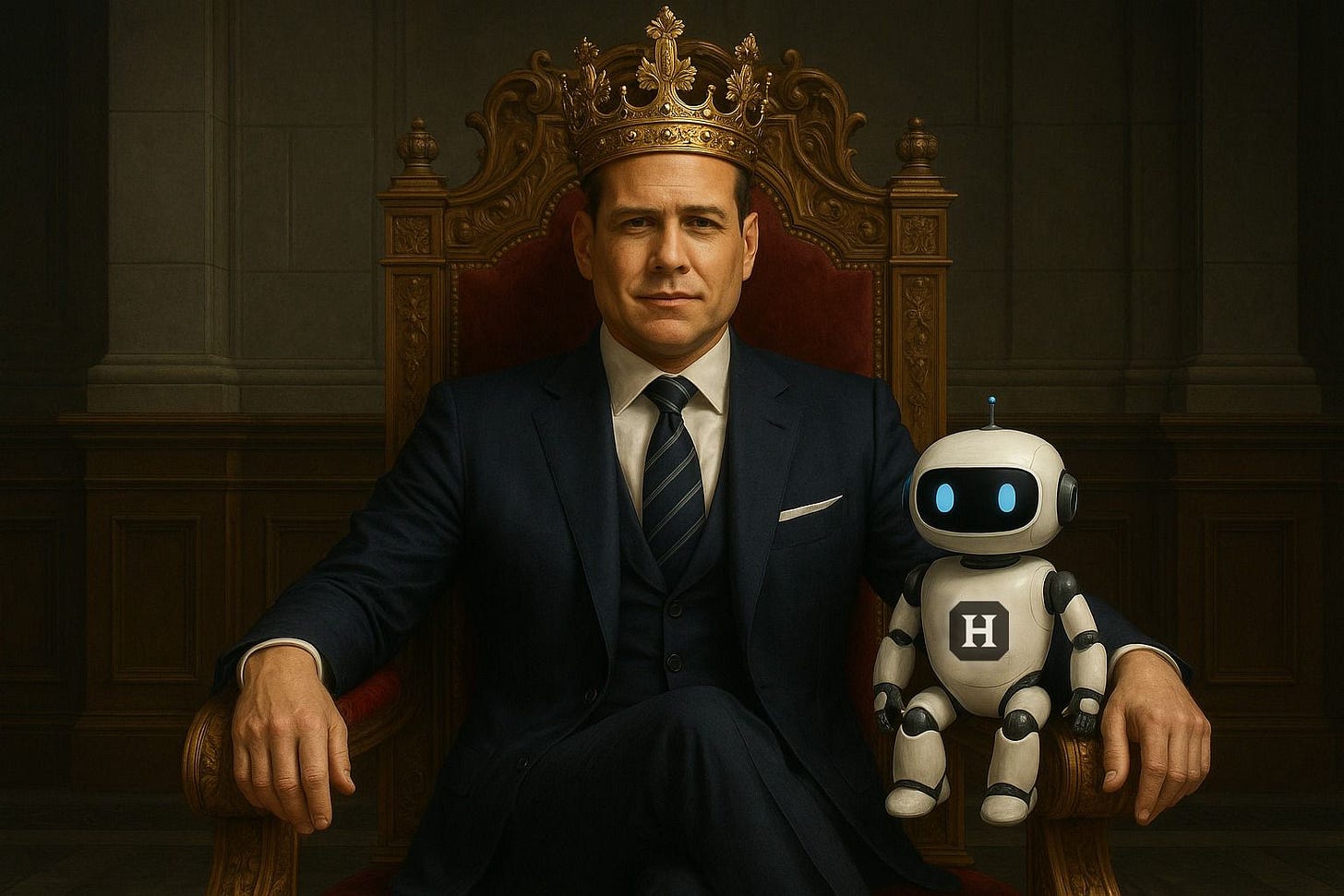
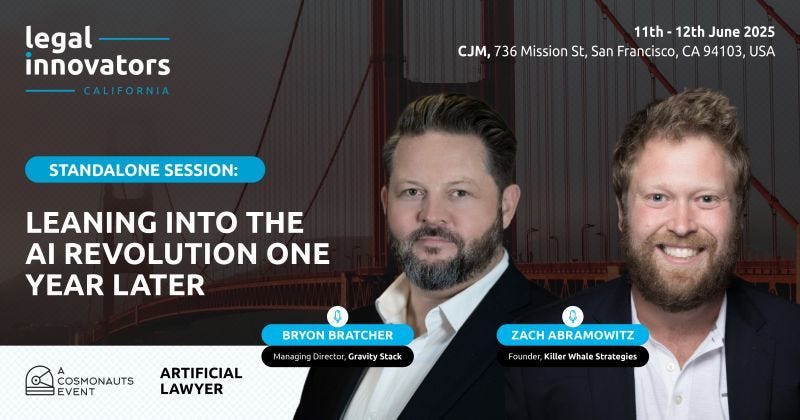
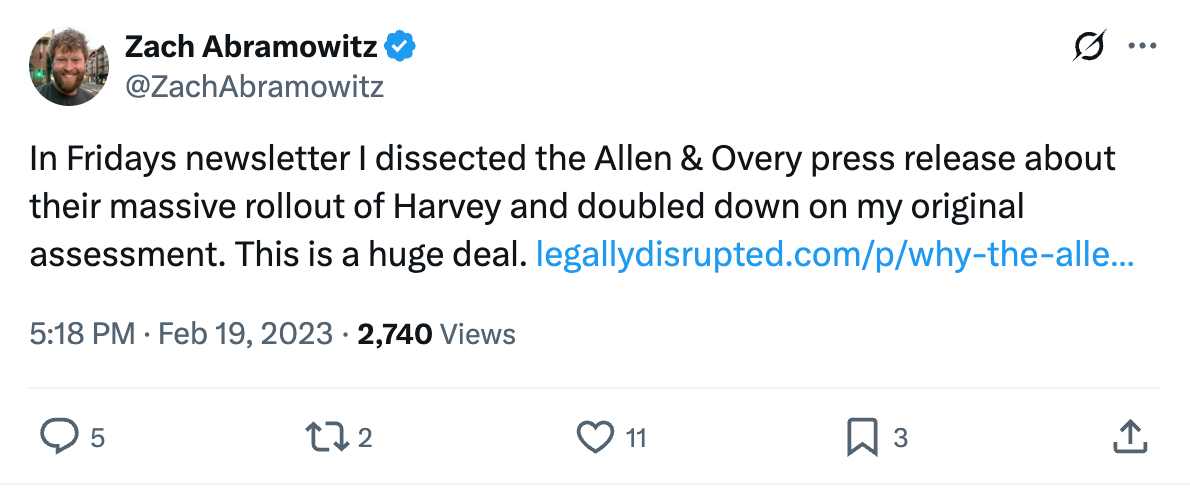
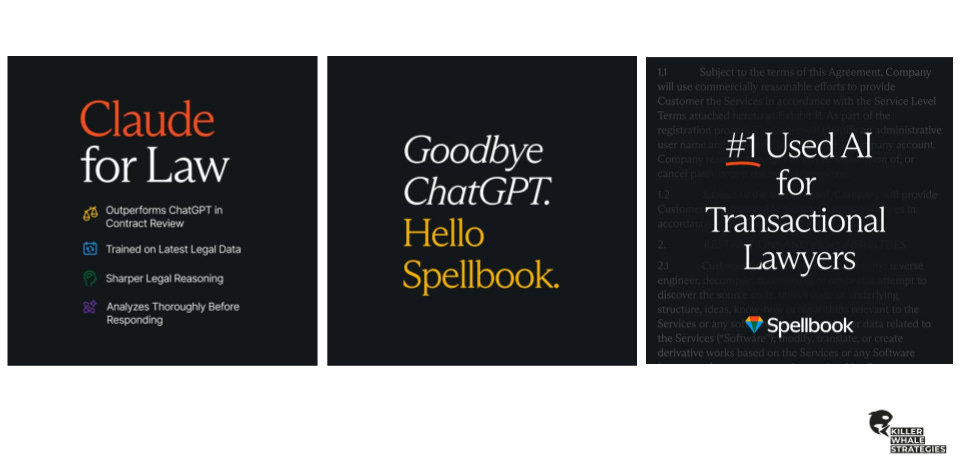


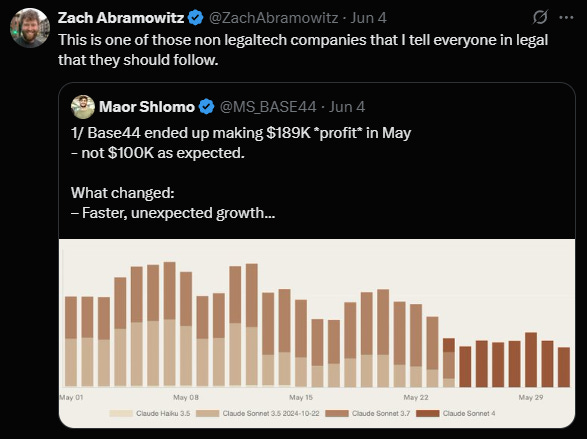
Great analysis, Zach. Harvey's $75M ARR success story has a compliance blind spot most firms haven't considered.
Every Harvey query creates discoverable logs at OpenAI that survive litigation holds. The NYT v. OpenAI case proved that provider retention policies don't protect client data when courts freeze deletion. Marketing claims of "we delete your data" become meaningless under preservation orders.
Harvey's API wrapper architecture means client communications flow directly through OpenAI's systems. At $75M ARR scale, that's massive volumes of privileged content sitting in discoverable third-party logs. The bigger Harvey gets, the bigger the target for subpoenas.
Harvey proves legal AI demand is real. But it also proves the need to solve the retention risk before the first major discovery motion hits.
I have been trying out a few of these legal AI tools recently. What stands out is how quickly they have gone from clunky assistants to something you could actually rely on for first drafts.